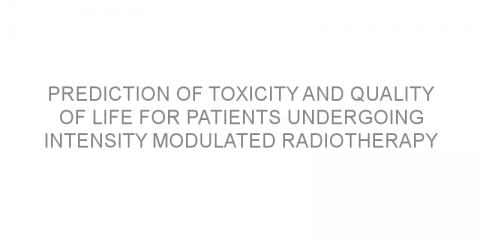In a nutshell The authors aimed to determine long-term survival in patients with adenocarcinoma treated with radical prostatectomy. Some background Adenocarcinoma is the most common type of prostate cancer. It starts in the prostate gland and requires early treatment to prevent the cancer spreading. Radical prostatectomy is a form of treatment...
Read MoreConfined or spread disease-Confined to the prostate gland Posts on Medivizor
The effects of non-metastatic prostate cancer treatment on urinary functions
In a nutshell The authors aimed to determine the effect of radiation and surgery on urinary adverse effects in prostate cancer. Some background Prostate cancer is usually treated with surgery or radiation with high rates of long-term survival. Surgery can involve procedures such as a radical prostatectomy which involves removing the entire...
Read MoreReviewing the cardicovascular effects of androgen deprivation therapy in prostate cancer
In a nutshell The authors aimed to determine whether patients who received androgen deprivation therapy were more at risk of experiencing cardiovascular events. Some background Androgen deprivation therapy (ADT) is a hormone treatment that targets male sex hormones involved in prostate cancer development, such as testosterone, in early stage...
Read MoreCan PSA level indicate either cure or the need for long term hormone suppression treatment?
In a nutshell This study investigated if measuring the levels of prostate specific antigen (PSA) after cancer therapy could indicate a cure or if the patient should be considered for long term androgen deprivation (suppression) therapy. The main finding was that lower PSA blood levels predict better survival in patients with prostate cancer. Some...
Read MoreNADiA ProsVue – accurate predictor of prostate cancer recurrence in radical prostatectomy patients
In a nutshell The authors aimed to determine whether their product could be used to determine prostate cancer-specific mortality and other outcomes after radical prostatectomy. Some background NADiA ProsVue is a device that determines the likelihood that a prostate cancer patient will experience recurrent cancer after receiving a radical...
Read MoreDoes hypofractionated radiotherapy have better or worse erectile function outcomes compared to conventional therapy?
In a nutshell The authors aimed to determine whether moderate hypofractionated radiotherapy would worsen sexual function after treatment. Some background There are many options for treatment of low-risk prostate cancer (cancer with a very small likelihood of spreading), therefore side-effects and patient preferences may drive the decision of...
Read MoreIs active surveillance the best treatment for low-risk prostate cancer?
In a nutshell The authors aimed to determine whether patients developed unfavorable disease features while under active surveillance. Some background Active surveillance involves no treatment. It involves close monitoring of prostate cancer patients to determine any sign of progression. It is currently recommended in low/intermediate risk...
Read MoreCan short-term hormone therapy pinpoint patients who need surgery?
In a nutshell This study investigated the impact of 3 months of androgen deprivation therapy (ADT) in a group of low-risk prostate cancer patients. Some background For patients with low-risk localized prostate cancer (has not spread beyond the prostate), treatment is not recommended but the patient is carefully...
Read MoreIs inflammation in prostate cancer a risk factor for more aggressive disease?
In a nutshell This study analyzed the association between inflammation and aggressive prostate cancer. Some background Inflammation may play a role in the development and progression of many cancers, including prostate cancer. Many pro-inflammatory cytokines (proteins that mediate inflammation) are associated with metastatic prostate...
Read MoreHow should biochemical recurrence be defined after external beam radiation therapy?
In a nutshell The authors aimed to evaluate if a new definition of biochemical recurrence is appropriate in prostate cancer treated with radical external beam radiation. Some background Prostate-specific antigen is a protein that is found at higher levels in the blood when prostate cancer is present. After prostatectomy (surgery to remove the...
Read MorePrediction of toxicity and quality of life for patients undergoing intensity modulated radiotherapy
In a nutshell The study determined the incidence of genitourinary toxicity and the quality of life in patients after intensity-modulated radiotherapy. Some background Patients with localized prostate cancer (cancer that has not spread) may be treated using a high-energy radiation that kills cancer cells (radiotherapy). Application of radiotherapy...
Read MoreAn effective treatment algorithm for prostate cancer
In a nutshell This study assessed the effectiveness of a brachytherapy algorithm as administered to patients with localized prostate cancer. Some background Patients with localized prostate cancer (cancer that has not spread) may be treated using a high-energy radiation that kills cancer cells (radiotherapy). Brachytherapy is a form...
Read More












